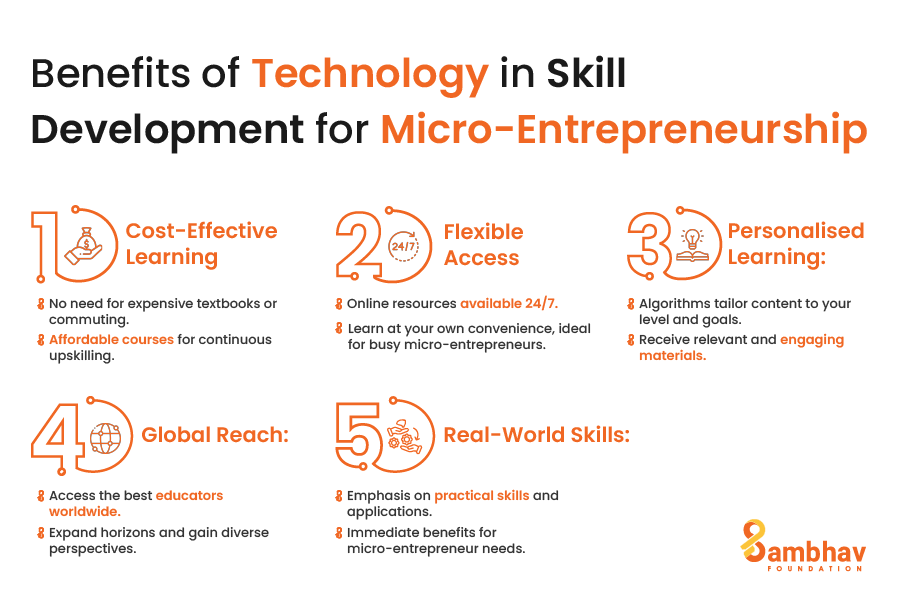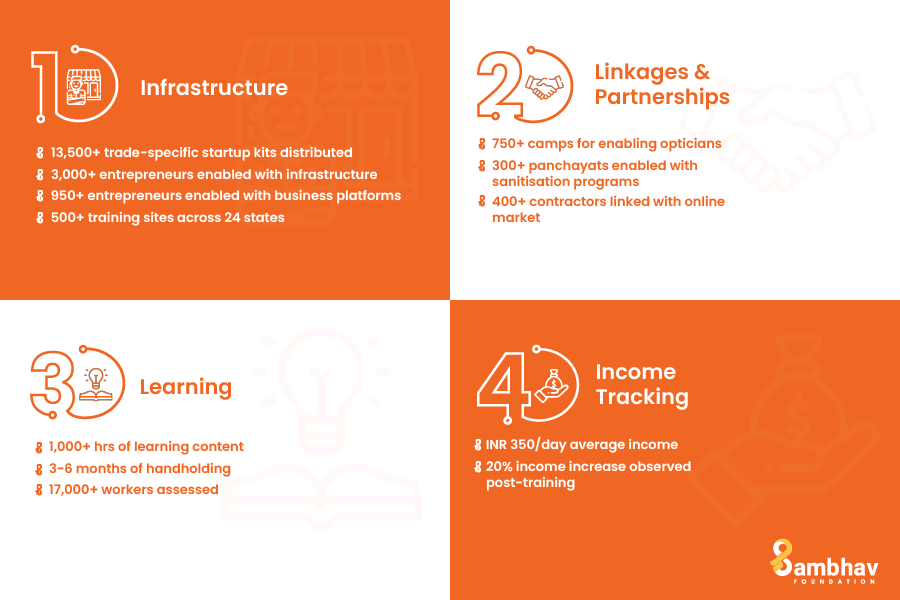How Is Technology Transforming Micro Entrepreneurship?
Did you know that micro-entrepreneurship is booming like never before in the digital era?
According to the World Bank, Small and Medium Enterprises (SMEs) account for most businesses worldwide and are important contributors to job creation and global economic development. They represent about 90% of businesses and more than 50% of employment worldwide.
But what’s even more fascinating is how technology is turbocharging this trend. It equips micro-entrepreneurs, particularly those from disadvantaged backgrounds, with the tools to manage their businesses efficiently, reach wider audiences, and compete on a global scale. It provides tools and platforms to overcome barriers like distance, limited access to markets, and financial resources.
So, why should you care about this blend of micro-businesses and technology? Because it’s not just about numbers and gadgets. It’s about fueling economic growth, creating jobs, driving innovation, and adapting to change.
In this blog, we’ll explore the rise of micro-entrepreneurship in the digital era and see how technology is revolutionising the path for aspiring business owners. Whether you’re a CSR professional or a high-net-worth individual, understanding this tech-powered approach can help you make a real difference.
What is Micro-Entrepreneurship?
Micro-entrepreneurship, in simple terms, refers to the practice of running small-scale businesses with limited resources. Individuals or small teams often manage these businesses, and they typically operate in sectors such as farming, crafts, textiles, or various services.
What makes micro-entrepreneurship remarkable is its knack for making the most out of whatever resources are available and constantly generating innovative ideas.
Micro-entrepreneurs’ key characteristics are their unwavering commitment to sustainability and deep-rooted connections to their local communities. They prioritise the well-being of their surroundings and are known for their resilience when faced with challenges.
Importantly, they play a vital role in bolstering their local economies by creating jobs and contributing positively to the communities they serve.
What is the Importance of Micro-Entrepreneurship?
Micro-entrepreneurship in today’s world holds significant potential to drive economic development, both locally and globally. Here’s why it matters:
- Boosting the Local and Global Economy: Even though these businesses are small, they have a big impact. They create jobs, make money, and help reduce poverty. They’re a crucial part of the informal economy, especially in countries that are still developing.
- Building Strong Communities: Micro-entrepreneurship acts as a catalyst for local development. It encourages self-reliance and fosters community cohesion by creating opportunities for neighbours to collaborate and support one another.
- Taking Control: It gives people the chance to be in charge of their own lives. They can earn money to support their families and improve their quality of life.
- Equality and Opportunity: Micro-entrepreneurship can help tackle issues like gender inequality and unemployment using technology. With equal access to resources and opportunities, women and marginalised groups can actively participate in economic activities, bringing about positive social change.
In sum, micro-entrepreneurship embodies the spirit of grassroots innovation and economic empowerment, making it a vital force for positive change in local communities and the global landscape.
What Challenges Do Micro-Entrepreneurs Face Today?
Despite the numerous benefits that micro-entrepreneurship offers, it has its challenges. Micro entrepreneurs often need help with their growth and success.
One of the primary challenges is limited access to financial resources. This hinders their ability to invest in business expansion, purchase essential equipment, or hire additional staff.
Another common challenge is the lack of business skills and knowledge. Many micro-entrepreneurs need more formal education or training in entrepreneurship, marketing, and finance. This gap in knowledge can lead to ineffective business practices, difficulties in reaching target markets, and inefficient financial management.
Furthermore, micro-entrepreneurs often need help accessing appropriate technology and infrastructure. Limited resources and infrastructure in rural areas or developing countries can hinder their ability to leverage technology for business growth and innovation.
In the next section, we will explore how technology can help overcome these challenges and empower micro-entrepreneurs in their journey toward success.
What is the Role of Technology in Micro-Entrepreneurship?
In today’s digital era, the concept of micro-entrepreneurship has taken on a new dimension. Micro-entrepreneurs are individuals or small teams with big dreams who harness the power of technology to establish and grow their businesses.
Micro entrepreneurs, particularly those from disadvantaged backgrounds, encounter challenges that can hinder their growth, such as limited access to money, lack of business know-how, and difficulty getting the right technology and tools.
However, technology can transform the landscape of micro-entrepreneurship and offer solutions to these problems. When equipped with the right resources, micro-entrepreneurs can overcome these obstacles and reach their full potential.
One way technology does that is by bridging the gap in business knowledge through online education and training programs. Micro entrepreneurs can access affordable or free online courses covering various aspects of entrepreneurship, marketing, and finance. These courses provide valuable insights and practical tips to improve business practices.
Technology has become the great equaliser, breaking down barriers and democratising entrepreneurship. Micro-entrepreneurs can leverage digital tools and platforms to reach global audiences, market their products or services, and compete with larger businesses.
Additionally, technology improves access to necessary infrastructure and resources.
For instance, e-commerce platforms provide a digital marketplace for micro-entrepreneurs to showcase and sell their products to customers worldwide. Social media and online advertising enable cost-effective promotion and customer engagement.
The role of technology extends beyond operational efficiency. It also offers data analytics and insights that help micro-entrepreneurs make informed decisions, adapt to market trends, and tailor their offerings to customer preferences.
Technology has transformed micro-entrepreneurship from a local endeavour to a global pursuit. It empowers individuals to turn their entrepreneurial dreams into reality, compete on a larger stage, and drive economic growth in the digital age.
The Role Of On-Job Training and Online Platforms in Fostering Micro- Entrepreneurship
While technology plays a significant role in fostering micro-entrepreneurship, providing micro-entrepreneurs with the necessary training and support is equally important.
On-job training programs can empower micro-entrepreneurs, especially those from disadvantaged backgrounds, by equipping them with the skills and knowledge needed to navigate the digital landscape and leverage technology for their business.
On-job training offers micro-entrepreneurs hands-on experience and practical guidance, allowing them to develop crucial skills such as digital marketing, online sales, and financial management.
This type of training can be conducted by experienced professionals or through partnerships with local educational institutions or organisations specialising in entrepreneurial development.
Moreover, online platforms can serve as valuable resources for micro-entrepreneurs to learn and connect with a broader network of like-minded individuals. Online communities and forums provide a platform for micro-entrepreneurs to share their experiences, exchange ideas, and seek advice from experts in the field. These platforms also offer access to webinars, tutorials, and online courses designed to address micro-entrepreneurs’ unique challenges.
By combining the power of technology with on-job training and online platforms, micro-entrepreneurs can acquire the necessary skills, knowledge, and support to thrive in their respective industries. This holistic approach fosters their personal growth and enhances the overall success rate of micro businesses.
Tech-Powered Learning: Empowering Micro Entrepreneurs with Skills and Knowledge
Small businesses must continuously update their knowledge and skills to succeed in today’s competitive business world. This is where technology can play a crucial role in providing them with access to educational resources and skill development opportunities.
Micro-entrepreneurs, whether running street food stalls, local boutiques, or freelance services, operate within niches that often require specialised expertise. In the past, traditional learning pathways, such as formal education or expensive training programs, were often out of reach for entrepreneurs from disadvantaged backgrounds due to cost and accessibility constraints.
However, the digital age has democratised education and skill development, making it accessible to even the most resource-constrained individuals.

What are the Benefits of Technology in Skill Development for Micro-Entrepreneurship?
See what advantages technology brings in skill development programs for micro-entrepreneurship:
- Cost-Effective: Tech-powered learning eliminates the need for expensive textbooks, commutes to physical classrooms, and high course fees. This affordability makes it feasible for micro-entrepreneurs to continuously upskill.
- Flexibility: Online resources are available 24/7, allowing micro-entrepreneurs to learn at their convenience. This flexibility is vital for those juggling business responsibilities and family commitments.
- Personalization: Many tech-powered learning platforms use algorithms to tailor content to the learner’s level and goals. This personalization ensures that micro-entrepreneurs receive relevant and engaging content.
- Global Access: Micro-entrepreneurs are no longer limited to local educational institutions. They can learn from the best educators and experts worldwide, expanding their horizons and perspectives.
- Real-World Application: Tech-powered learning often emphasises practical skills and real-world applications, which align well with the immediate needs of micro-entrepreneurs.
Why are Employability Skills Important in Micro-Entrepreneurship?
Consider this scenario: you manage a small online business offering handmade products or services like website design. Beyond your core product or service knowledge, employability skills like effective communication, problem-solving abilities, adaptability, and digital proficiency are essential for success.
Here’s why they matter so much for micro-entrepreneurship:
1. Communication: The ability to communicate clearly and respectfully with your customers is fundamental. This is especially vital for individuals from marginalised communities, as it helps establish trust and foster positive relationships.
2. Problem-solving: Possessing problem-solving skills equips people to swiftly navigate and overcome business challenges, serving as a valuable asset against setbacks.
3. Adaptability: The tech industry evolves rapidly. Being adaptable allows you to keep pace with new technologies and ideas, ensuring your business remains competitive and relevant.
4. Digital Literacy: A solid understanding of digital tools and social media is imperative in today’s digital marketplace. This skill opens doors to a wider customer base and streamlines business management processes.
Importantly, these skills aren’t solely about employment; they empower individuals to succeed in their micro-enterprises. They facilitate meaningful connections with customers, the cultivation of a strong reputation, and business growth – a particularly vital opportunity for individuals hailing from marginalised communities.
By developing these skills, people from all places or backgrounds can surmount barriers and create opportunities in the world of micro-entrepreneurship, breaking down traditional constraints.
The Rise of Micro-Entrepreneurship in India
India’s micro, small, and medium enterprises (MSMEs) make significant contributions to the country’s economic growth. They play a vital role in various aspects of socio-economic development, including job creation, reducing inequalities, addressing regional imbalances, and supplying cost-effective raw materials to different sectors.
Micro-entrepreneurs, particularly those from disadvantaged backgrounds, are motivated by improving their livelihoods and identifying and solving large-scale challenges. They are leading the charge in India’s economic development, leveraging technology to their advantage.
Even during challenging economic times, they have proven resilient, providing immediate job opportunities with modest capital investments. This effectively harnesses untapped financial resources and human skills.
Recognizing the significance of MSMEs, the government has launched several schemes to promote micro-entrepreneurship, including the Prime Minister Employment Generation Programme (PMEGP), the Scheme for Promoting Innovation, Rural Industry, and Entrepreneurship (ASPIRE), SFURTI (Scheme of Fund for Regeneration of Traditional Industries), Coir Udyami Yojna, and Credit Guarantee Fund Scheme.
In addition to this, startup incubators work with micro-entrepreneurs in smaller towns in India.
These incubators offer access to entrepreneurship training, innovation labs, advanced technologies, internet connectivity, mentorship by industry experts, information on government programs, access to venture capital for promising startups, talent development, co-working spaces, and skill enhancement programs.
These incubators empower first-time entrepreneurs and rural youth, from marginalised communities, enabling them to unleash their potential and contribute to India’s journey towards becoming one of the world’s largest economies and a global hub for industry and manufacturing.
Empowering Marginalised Communities through Micro-Entrepreneurship
The Sambhav Foundation is committed to helping marginalised communities by supporting them in starting and growing their businesses through Micro-Entrepreneurship programs. We provide the tools and support they need for a successful journey towards economic empowerment.
For example, we offer:
- Training and Skill Development
One of the cornerstones of our approach is offering comprehensive training and capacity-building programs. These cover essential business skills, including financial management, marketing strategies, and exceptional customer service. Furthermore, we also offer training in specific industries such as agriculture, manufacturing, and retail.
- Access to Financial Resources
We understand that access to financial resources is crucial for micro-entrepreneurs. To bridge this gap, our foundation offers micro-loans and facilitates connections with various financial institutions, ensuring aspiring entrepreneurs have the necessary capital to kickstart and expand their ventures.
- Mentorship and Guidance
Micro-entrepreneurs receive invaluable mentorship and guidance from our dedicated staff and volunteers. This support extends throughout the entire entrepreneurial journey, encompassing business planning, marketing strategies, and other vital aspects of business management.
Our Tech-Centric Initiatives for Micro-Entrepreneurs
Some of micro-entrepreneurship initiatives that are focused on tech, digital business tools, and small-scale ventures include:
- Project Digital Saksharata: This project provides digital literacy training to micro-entrepreneurs so that they can use technology to improve their businesses. The training covers topics such as using the Internet, social media, and e-commerce platforms.
- Project E-Mitra: This project provides micro-entrepreneurs with access to government services through online kiosks. The kiosks offer a variety of services, such as bill payments, passport applications, and voter registration.
- Project Udyam Mitra: This project provides micro-entrepreneurs with mentorship and support from experienced business professionals. The mentors help micro-entrepreneurs to develop business plans, market their products and services, and manage their finances.
Creating a Ripple of Empowerment- Success Stories
Sambhav Foundation’s Micro-Entrepreneurship initiatives empower individuals to achieve financial independence and create a brighter future for themselves and their communities.
Through training, financial support, mentorship, and tech-focused initiatives, we are fostering a culture of entrepreneurship and economic growth among those who need it most.

Binata from Balasore, Odisha, a micro-entrepreneur, shared, “I have big dreams. I want to work on myself. Before I received training from Sambhav Foundation, I was struggling to make ends meet. But after the training, I was able to start my own business, and now I am earning a good income.”

Jyotisman from Golaghat, Assam, another micro-entrepreneur, expressed his gratitude. Sambhav Foundation’s training helped him in his career path focused on automobile detailing. “I particularly liked the training because I did not have any other opportunity to get practical exposure,” he says. His monthly income from his automobile detailing shop now stands at Rs 35,000.
OUR IMPACT IN NUMBERS

Do You Want to Make A Change?
For anyone seeking to make a meaningful impact, the journey begins with a commitment to empowerment and innovation.
Here are some actionable insights to guide your philanthropic efforts:
1. Strategic Collaboration:
- Seek partnerships with organisations like Sambhav Foundation that have a proven track record in tech-driven micro-entrepreneurship.
- Collaborate with other like-minded entities to pool resources, expertise, and networks for greater impact.
2. Impact Measurement:
- Invest in robust impact measurement systems to assess the effectiveness of your initiatives.
- Monitor key performance indicators (KPIs) related to economic growth, employment generation, and community development.
3. Capacity Building:
- Support capacity-building programs that enhance the digital skills of micro-entrepreneurs.
- Offer training and mentorship to help them adapt to evolving technological trends.
4. Engage Your Network:
- Leverage your network to connect micro-entrepreneurs with opportunities, resources, and markets.
- Encourage other CSR leaders and HNIs to join the cause, creating a ripple effect of support.
5. Long-Term Commitment:
- Recognize that tech-infused micro-entrepreneurship is a long-term endeavour.
- Commit to sustained support, as lasting impact often requires time to manifest.
By implementing these actionable insights, CSR leaders and HNIs can support tech-driven micro-entrepreneurship and create a legacy of economic growth, empowerment, and inclusive development.
Embracing Technology to Drive Micro Entrepreneurship Forward
In conclusion, in a world where technological advancements fuel innovation and progress, micro-entrepreneurship stands as a shining example of how the fusion of ambition and digital tools can lead to transformative change.
The journey from an idea to a thriving small-scale venture has never been more accessible, thanks to the power of technology.
As we’ve explored the role of technology in empowering micro-entrepreneurs, it’s evident that this dynamic synergy is reshaping economies and communities.
Take Sambhav Foundation, for instance; we are at the forefront of pioneering approaches that showcase how technology can uplift marginalised individuals by fostering micro-entrepreneurship. Through our programs and initiatives, we have provided real-world examples of how technology bridges gaps, fosters scalability, and ultimately transforms lives.
As we move into an era where the future of tech in micro-entrepreneurship holds even more promise, it’s crucial to recognize the potential of embracing this transformative approach.
So, whether you’re a CSR professional seeking to make a change or an aspiring entrepreneur, consider the boundless possibilities that technology offers.
Join us, invest in tech-driven micro-entrepreneurship, and together, we’ll empower a new wave of micro-entrepreneurs who will shape India’s future.
For more information, visit our website today.



